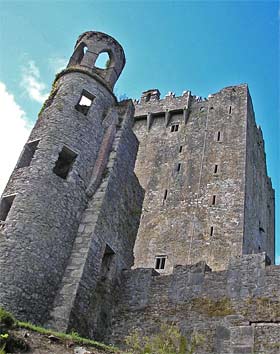UC Berkeley Press Release
Digital project to boost Irish studies with 'virtual Ireland' website
BERKELEY – Irish studies scholars tend to be scattered in isolated enclaves about the globe, as are the critical literary, scientific, cultural and historic resources needed for related research. It can easily take years or even decades of an academic career to track down and contextualize one's sought-after information.
 The "virtual Ireland" collaboration between UC Berkeley and the Queen's University aims to create "a comprehensive, multi-disciplinary digital library of e-resources relating to Ireland." (NASA satellite photo) |
The project is primarily supported by a $349,996 "Advancing Knowledge" grant funded jointly by the National Endowment for the Humanities (NEH) and the Institute of Museum and Library Services to bring the trans-Atlantic humanities scholars together with museum, library, archive and information technology (IT) professionals. The institute is the primary source of federal support for the nation's libraries and museums.
"This project transforms Irish studies and reinvents the library reference service," said project leader Michael Buckland, an emeritus professor in UC Berkeley's Information School. "In the past, one could use reference works in the library's reference collection to find explanations. We intend to show how that valuable service can be made available online. It's a bigger deal in Irish studies than in almost any other discipline."
UC Berkeley's task is to develop open source search and retrieval tools and interfaces to explore contexts and relationships through names, places and other words in maps, atlases, bibliographies, dictionaries, primary texts and secondary works.
"We need to handcraft these tools and show they can work," said Buckland, calling the assignment "the perfect niche for humanities scholars and IT professionals in the ivory tower to show how it can be done."
UC Berkeley's project participants include the campus's Electronic Cultural Atlas Initiative, Celtic Studies Program, Information School, and Emma Goldman Papers Project.
Faculty as well as undergraduate and graduate students in UC Berkeley's Celtic Studies Program will be involved in evaluating the effectiveness of new electronic tools and the cultural, historic and linguistic complexities of materials. Faculty and students at the Information School will lend a hand with development of advanced search tools, particularly to explore materials by time periods, geographic regions and across different fields and genres. The Emma Goldman Papers Project, which has archival papers relating to Goldman's Irish contacts and interests, will assist with designing and testing tools such as the embedding of notes, live links and hyperlinks.
At Queen's University of Belfast, the Centre for Data Digitisation and Analysis is taking the lead. The British government and JSTOR, a not-for-profit organization established to create and maintain an archive of important scholarly journals that cover many disciplines, have funded the scanning, digitization and preservation of the back issues of 100 leading journals that represent approximately 1 million pages of material. The project also will include 205 monographs and 2,500 manuscript pages from core collections on Irish culture and history.
 With a few clicks of the mouse, visitors interested in Irish castles, like the famous Blarney Castle above, would be able to find locations, descriptions, historic and literary references on the Web. (Valdoria photo) |
Deirdre Wildy, a principal investigator for the project at Queen's University, said the project offers a solution to the underutilization of the treasure trove of influential materials relating to Irish studies.
Digitization of some Irish studies material has lagged behind that of other collections, said Daniel Melia, co-principal investigator for the new project and a UC Berkeley professor of Celtic studies and rhetoric, as well as an authority on Irish Gaelic and Irish folklore. Valuable material often is in storage or difficult to access, without published indexes to guide scholars to what is available.
The new system, Melia said, should enable visitors to the website to draw a loop on a map and enter the word "castles," for example. Next, users would see links to a list of castles within the designated area, as well as written entries about each castle and historic and literary references to it.
Or, someone could enter a Latin medieval place name for an Irish location and discover related information such as the location's longitude and latitude, maps identifying nearby sites, census data, fairy tales, folk tales, tribal names that influenced the place name, oral histories, overlays of modern political boundaries and photos.
"All these links and bridges will add up," said Buckland. "Before, it would have taken years of study to figure out there are even these materials or resources. The implications are huge."
Ironically, Ireland itself has tended to focus more on foreign and contemporary topics, said Wildy, since it experienced a technology boom in the last 15 years or so. But interest in digitizing Irish studies materials now appears to be increasing, said Melia.
"This makes it so much faster and easier for anybody, anywhere," said Buckland. "You don't have to be in Belfast or Dublin for long periods of time looking for a book, finding it and studying it - or honing in on your particular issue."
It is likely to dramatically speed up doctoral study in Irish studies, said Melia.
Ell and others acknowledged concern that humanities scholars have not used digital resources as extensively as other scholars. Melia lamented that too many online resources have relied on "the Google model" with its "million grains of sand with no hierarchy or difference between them."
"The mission of the NEH has always been to advance excellence in the humanities, and today that must mean maximizing the use of advanced technology," said Bruce Cole, chair of the NEH.
More details about the project, which could serve as a model for other humanities efforts, are online at: http://ecai.org/neh2007/.

